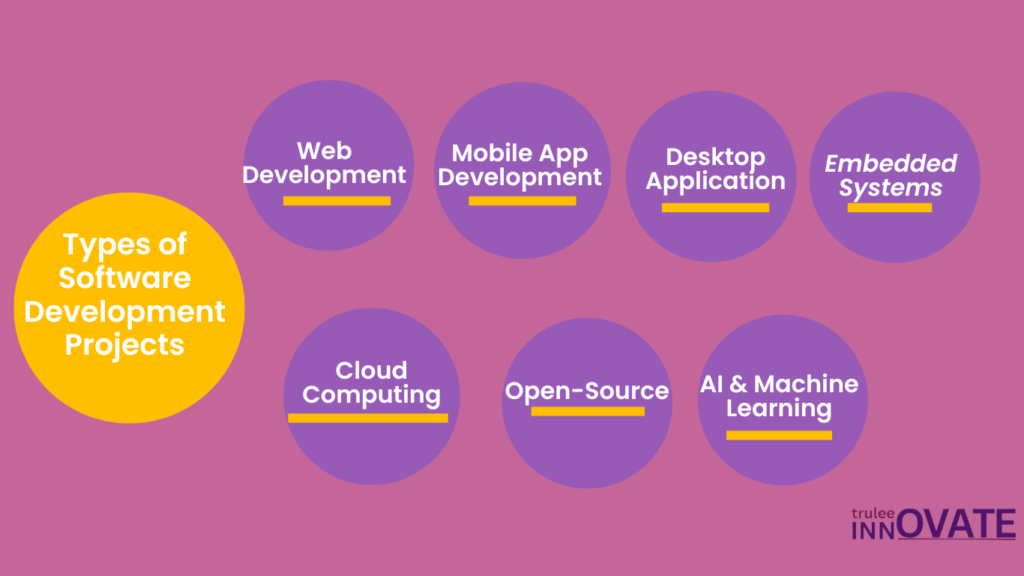Software development projects are the backbone of modern technology, driving innovation and solving complex problems across industries. Whether you’re a seasoned software engineer or a beginner, understanding the complexities of software development projects is essential for delivering high-quality solutions. This guide will explore the types of software development projects, their stages, tools, challenges, and best practices, while also highlighting how Digital Marketing for Startups can benefit from these projects.
1. Introduction to Software Development Projects
Software development projects involve the process of designing, creating, testing, and maintaining software applications. These projects can range from small-scale applications to large, enterprise-level systems. They are critical for businesses, governments, and individuals, enabling them to automate processes, improve efficiency, and deliver value to end-users.
In today’s fast-paced digital world, software development projects are not just about writing code. They require a holistic approach that includes planning, collaboration, and continuous improvement. Whether you’re working on software engineering projects with source code or developing proprietary solutions, the principles remain the same.
2. Why Software Development Projects are Crucial in Modern Engineering
Software development projects play a pivotal role in shaping the technological landscape. Here’s why they are indispensable:
- Innovation: They drive innovation by creating new tools, platforms, and applications.
- Automation: They enable businesses to automate repetitive tasks, saving time and resources.
- Problem-Solving: They provide solutions to real-world problems, from healthcare to finance.
- Competitive Advantage: Companies that invest in software development projects gain a competitive edge in the market.
- Scalability: Well-executed projects allow businesses to scale their operations efficiently.
For startups, especially in the realm of Digital Marketing for Startups, software development projects can be a game-changer. Custom tools and platforms can help startups streamline their marketing efforts, analyze data, and reach their target audience more effectively.
3. Types of Software Development Projects in Software Engineering
Software development projects come in various forms, each serving a unique purpose. Here are the most common types of software development projects in software engineering:
a. Web Development Projects
These projects focus on creating websites and web applications. Examples include e-commerce platforms, content management systems (CMS), and social media networks.
b. Mobile App Development Projects
With the rise of smartphones, mobile app development has become a cornerstone of software engineering. These projects involve creating apps for iOS, Android, or cross-platform solutions.
c. Desktop Application Projects
These projects involve developing software for desktop operating systems like Windows, macOS, or Linux. Examples include productivity tools, graphic design software, and gaming applications.
d. Embedded Systems Projects
Embedded systems projects focus on developing software for hardware devices, such as IoT devices, medical equipment, and automotive systems.
e. Cloud Computing Projects
These projects involve creating cloud-based solutions, such as SaaS (Software as a Service) platforms, cloud storage systems, and virtualization tools.
f. Open-Source Projects
Open-source software engineering projects with source code are collaborative efforts where developers contribute to publicly available software. Examples include Linux, Apache, and TensorFlow.
g. AI and Machine Learning Projects
These projects leverage artificial intelligence and machine learning to create intelligent systems, such as chatbots, recommendation engines, and predictive analytics tools.

4. Key Stages of Software Development Projects
Every software development project follows a structured process to ensure success. Here are the key stages:
a. Requirement Analysis
This stage involves gathering and analyzing the requirements of the project. It’s crucial to understand the needs of stakeholders and end-users.
b. Planning
During this stage, the project scope, timeline, budget, and resources are defined. A well-structured plan sets the foundation for a successful project.
c. Design
The design stage involves creating the architecture and user interface of the software. Wireframes, prototypes, and system diagrams are developed during this phase.
d. Development
This is the coding phase, where developers write the actual code for the software. Agile methodologies are often used to ensure flexibility and collaboration.
e. Testing
Testing is critical to identify and fix bugs, ensure functionality, and validate the software against the requirements.
f. Deployment
Once the software is tested and approved, it is deployed to the production environment for end-users.
g. Maintenance
Post-deployment, the software requires regular updates, bug fixes, and improvements to ensure optimal performance.
5. Popular Software Engineering Projects with Source Code
For aspiring developers, working on software engineering projects with source code is an excellent way to gain hands-on experience. Here are some popular project ideas:
- E-commerce Website: Build a fully functional online store with features like product listings, shopping carts, and payment gateways.
- Chat Application: Develop a real-time chat app using technologies like WebSocket and React.
- Task Management Tool: Create a project management tool with task assignment, progress tracking, and notifications.
- Weather App: Build a mobile app that fetches real-time weather data using APIs.
- Machine Learning Model: Develop a predictive model for stock price analysis or sentiment analysis.
These projects not only enhance your technical skills but also provide valuable portfolio pieces for your career.
6. Tools and Technologies for Successful Software Development Projects
The right tools and technologies can make or break a software development project. Here are some essential ones:
- Programming Languages: Python, Java, JavaScript, C#, and Ruby.
- Frameworks: React, Angular, Django, Spring Boot, and Flask.
- Version Control Systems: Git and GitHub for code management.
- Project Management Tools: Jira, Trello, and Asana for task tracking.
- Testing Tools: Selenium, JUnit, and Postman for automated testing.
- Cloud Platforms: AWS, Azure, and Google Cloud for hosting and scalability.
For startups focusing on Digital Marketing for Startups, tools like Google Analytics, HubSpot, and Mailchimp can be integrated into custom software solutions to enhance marketing efforts.
7. Challenges in Software Development Projects and How to Overcome Them
Software development projects are not without challenges. Here are a few such ones along with solutions:
a. Scope Creep
When project requirements grow beyond the initial plan, this is known as scope creep.. To avoid this, clearly define the project scope and stick to it.
b. Tight Deadlines
Tight deadlines can lead to rushed work and poor-quality software. To overcome this obstacle, efficient time management and prioritizing are essential.
c. Communication Gaps
Miscommunication between team members can derail a project. Regular meetings and collaboration tools can help bridge this gap.
d. Technical Debt
Technical debt arises when shortcuts are taken during development. Regular code reviews and refactoring can help mitigate this issue.
8. Best Practices for Managing Software Development Projects
To ensure the success of your software development projects, follow these best practices:
- Adopt Agile Methodologies: Agile promotes flexibility, collaboration, and continuous improvement.
- Focus on User Experience: Always prioritize the needs of the end-user.
- Conduct Regular Testing: Testing should be an ongoing process, not just a final step.
- Document Everything: Proper documentation ensures clarity and consistency.
- Leverage Automation: Use automation tools for testing, deployment, and monitoring.
9. The Role of Agile Methodology in Software Development Projects
Agile methodology has revolutionized software development by emphasizing iterative progress, collaboration, and adaptability. Key principles include:
- Sprints: Breaking the project into small, manageable tasks.
- Daily Stand-Ups: Regular team meetings to discuss progress and challenges.
- Continuous Feedback: Regularly gathering feedback from stakeholders and end-users.
Agile is particularly beneficial for startups, including those in Digital Marketing for Startups, as it allows for quick adjustments based on market trends and customer needs.
10. Case Studies: Successful Software Development Projects in the Industry
Here are some real-world examples of successful software development projects:
- Netflix: Built a scalable streaming platform using microservices architecture.
- Uber: Developed a real-time ride-hailing app with advanced geolocation features.
- Slack: Created a collaborative communication tool that transformed workplace communication.
These projects demonstrate the power of innovative software development in solving complex problems.
11. How to Choose the Right Software Development Project for Your Team
Choosing the right project depends on your team’s skills, resources, and goals. Consider factors like:
- Project Complexity: Ensure the project aligns with your team’s expertise.
- Resource Availability: Assess the availability of time, budget, and tools.
- Market Demand: Choose projects that address real-world needs and have growth potential.
12. The Future of Software Development Projects: Trends and Predictions
The future of software development projects is shaped by emerging trends like:
- AI and Machine Learning Integration
- Low-Code and No-Code Platforms
- Increased Focus on Cybersecurity
- Edge Computing
- Sustainable Software Development
These trends will continue to influence how software development projects are conceptualized and executed.
13. Digital Marketing for Startups: Leveraging Software Development Projects for Growth
For startups, especially in the digital marketing space, custom software solutions can be a game-changer. Here’s how:
- Custom CRM Systems: Streamline customer relationship management.
- Marketing Automation Tools: Automate repetitive tasks like email campaigns and social media posting.
- Data Analytics Platforms: Gain insights into customer behavior and campaign performance.
- Personalized Marketing Solutions: Deliver tailored content to your target audience.
By investing in software development projects, startups can enhance their marketing efforts and achieve sustainable growth.
14. Conclusion: Mastering the Art of Software Development Projects
Software development projects are at the heart of technological innovation. By understanding the types, stages, tools, and best practices, you can deliver successful projects that drive value and growth. Whether you’re working on software engineering projects with source code or developing custom solutions for Digital Marketing for Startups, the principles remain the same. Embrace collaboration, stay adaptable, and always prioritize the end-user.


